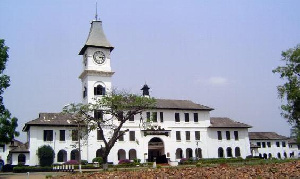Opinions of Thursday, 3 June 2021
Columnist: Isaac Ofori
Achimota School and the Rastafarians impasse: Human rights concern for Ghana
The recent impasse between Achimota School and the children of Rastafarian descent had gained some level of attention in Ghana since the matter became a public issue.
The Rastafarians were conspicuously denied admission despite the computer placement system placed them in the school. According to Achimota, such hairstyles are not allowed in school.
The school further asserted that if the children want admission to the school, they must denounce their cult and cut their hair to fit the school’s standard. This did not go down well with their parents who believe that worldwide Rastafarianism had been embraced as a form of culture and religion and practice by many.
Again, the parents found the posture of Achimota preposterous and decided to test the human rights laws of this country as guaranteed by the constitution of Ghana. The children, since they cannot exercise their rights directly, sued the school through their parents to seek justice and equal rights to education irrespective of religion or culture.
The Human Rights Court ruled in favour of the children stating that “fundamental human rights are not absolute and can be limited by statutes and policies. But this must be juxtaposed with the public interest as in this current case”.
The ruling brings to fore how human rights issues had been given less attention in this country. There are countless instances where people’s rights had either been denied them or been stripped from them because the duty bearers are either relax with the law enforcement or had not given human rights issues a priority.
Despite the human rights court exists to adjudicate issues of rights violation, it important to note that many Ghanaians are vulnerable when it comes to rights protection. The laws of this country must naturally protect the inalienable rights of its citizens without compromise but the attainments of these rights are of no interest to duty bearers. Ghana is a member of the United Nations had automatically signed on to the historic document of the Universal Declaration of Human Rights and behoves the nation to ensure that the rights and freedom of every single individual are protected without discrimination.
Human rights are universal and inalienable; indivisible; interdependent and interrelated. They are universal because everyone is born with and possesses the same rights, regardless of where they live, their gender or race, or their religious, cultural or ethnic background. It is inalienable because people’s rights can never be taken away. They apply to all equally, and all have the right to participate in decisions that affect their lives. They are upheld by the rule of law and strengthened through legitimate claims for duty-bearers to be accountable to international standards. All individuals are equal as human beings and by virtue of the inherent dignity of each human person.
No one, therefore, should suffer discrimination on the basis of race, colour, ethnicity, gender, age, language, sexual orientation, religion, political or other opinions, national, social or geographical origin, disability, property, birth or other status as established by human rights standards.
This gives a clear picture of how the rights of individual become non-negotiable. We must understand as a nation that the global community had to cross the stage of a rigid and bias society to a society of rights and freedoms. We need an open society where people can exercise, enjoy and claim their basic rights with the ultimate support of the state. Of course, human rights are not the yardstick for breaking the law neither is it a standard for deviant behaviour but a certain feeling of belongingness as a human being.
In the case of the Achimota School, the children involve cannot be denied their right to education just because they belong to a certain culture or religion. Achimota is a Christian school and definitely will infringe on the right of other children who are not Christian if they force them to worship the Christian way. The situation is consistent with how children of fetish priests had suffered the denial of rights by certain institutions in this country describing them as unkempt or unfit for purpose. On many occasions, individuals are forced to denounce their religion or culture before they can claim belongingness.
This is utterly in violation of universal human rights and the state, to some extent, had failed to ensure that the rights of people are fairly protected. A clear observation of the Achimota situation would have been that these children could have been denied their right if the human court did not step in.
Another question comes to mind: how many of us Ghanaians have the financial muscles to seek redress in court? Poverty, fear of injustice coupled with lack of development had made many people forfeit their rights or their rights denied them.
Unfortunately, there are no mechanisms to ensure that the rights of individual are protected since many Ghanaians cannot afford the cost of adjudication. Although many agencies exist in the country to ensure that people's rights are protected the state as a major duty bearer did not have policy guidelines to ensure that citizen can claim their rights and enjoy their freedom without fear or favour.
States and other duty-bearers are answerable for the observance of human rights. In this regard, they have to comply with the legal norms and standards enshrined in international human rights instruments. Where they fail to do so, aggrieved rights-holders are entitled to institute proceedings for appropriate redress before a competent court or other adjudicators in accordance with the rules and procedures provided by law. Individuals, the media, civil society and the international community play important roles in holding governments accountable for their obligation to uphold human rights.
Entertainment










